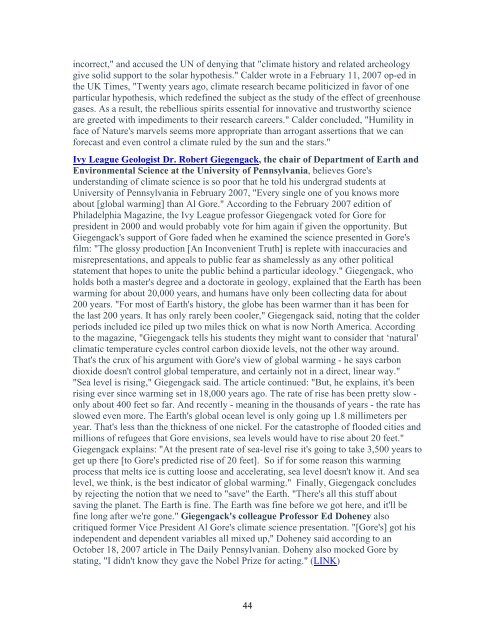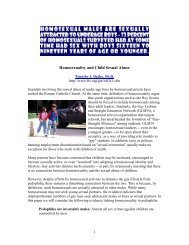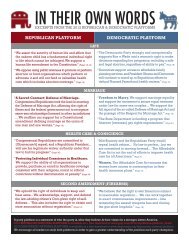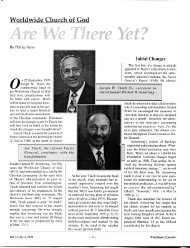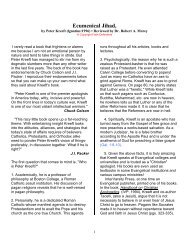U.S. Senate Report: Over 400 Prominent Scientists Disputed ... - NJIAT
U.S. Senate Report: Over 400 Prominent Scientists Disputed ... - NJIAT
U.S. Senate Report: Over 400 Prominent Scientists Disputed ... - NJIAT
You also want an ePaper? Increase the reach of your titles
YUMPU automatically turns print PDFs into web optimized ePapers that Google loves.
incorrect," and accused the UN of denying that "climate history and related archeology<br />
give solid support to the solar hypothesis." Calder wrote in a February 11, 2007 op-ed in<br />
the UK Times, "Twenty years ago, climate research became politicized in favor of one<br />
particular hypothesis, which redefined the subject as the study of the effect of greenhouse<br />
gases. As a result, the rebellious spirits essential for innovative and trustworthy science<br />
are greeted with impediments to their research careers." Calder concluded, "Humility in<br />
face of Nature's marvels seems more appropriate than arrogant assertions that we can<br />
forecast and even control a climate ruled by the sun and the stars."<br />
Ivy League Geologist Dr. Robert Giegengack, the chair of Department of Earth and<br />
Environmental Science at the University of Pennsylvania, believes Gore's<br />
understanding of climate science is so poor that he told his undergrad students at<br />
University of Pennsylvania in February 2007, "Every single one of you knows more<br />
about [global warming] than Al Gore." According to the February 2007 edition of<br />
Philadelphia Magazine, the Ivy League professor Giegengack voted for Gore for<br />
president in 2000 and would probably vote for him again if given the opportunity. But<br />
Giegengack's support of Gore faded when he examined the science presented in Gore's<br />
film: "The glossy production [An Inconvenient Truth] is replete with inaccuracies and<br />
misrepresentations, and appeals to public fear as shamelessly as any other political<br />
statement that hopes to unite the public behind a particular ideology." Giegengack, who<br />
holds both a master's degree and a doctorate in geology, explained that the Earth has been<br />
warming for about 20,000 years, and humans have only been collecting data for about<br />
200 years. "For most of Earth's history, the globe has been warmer than it has been for<br />
the last 200 years. It has only rarely been cooler," Giegengack said, noting that the colder<br />
periods included ice piled up two miles thick on what is now North America. According<br />
to the magazine, "Giegengack tells his students they might want to consider that ‘natural'<br />
climatic temperature cycles control carbon dioxide levels, not the other way around.<br />
That's the crux of his argument with Gore's view of global warming - he says carbon<br />
dioxide doesn't control global temperature, and certainly not in a direct, linear way."<br />
"Sea level is rising," Giegengack said. The article continued: "But, he explains, it's been<br />
rising ever since warming set in 18,000 years ago. The rate of rise has been pretty slow -<br />
only about <strong>400</strong> feet so far. And recently - meaning in the thousands of years - the rate has<br />
slowed even more. The Earth's global ocean level is only going up 1.8 millimeters per<br />
year. That's less than the thickness of one nickel. For the catastrophe of flooded cities and<br />
millions of refugees that Gore envisions, sea levels would have to rise about 20 feet."<br />
Giegengack explains: "At the present rate of sea-level rise it's going to take 3,500 years to<br />
get up there [to Gore's predicted rise of 20 feet]. So if for some reason this warming<br />
process that melts ice is cutting loose and accelerating, sea level doesn't know it. And sea<br />
level, we think, is the best indicator of global warming." Finally, Giegengack concludes<br />
by rejecting the notion that we need to "save" the Earth. "There's all this stuff about<br />
saving the planet. The Earth is fine. The Earth was fine before we got here, and it'll be<br />
fine long after we're gone." Giegengack's colleague Professor Ed Doheney also<br />
critiqued former Vice President Al Gore's climate science presentation. "[Gore's] got his<br />
independent and dependent variables all mixed up," Doheney said according to an<br />
October 18, 2007 article in The Daily Pennsylvanian. Doheny also mocked Gore by<br />
stating, "I didn't know they gave the Nobel Prize for acting." (LINK)<br />
44


